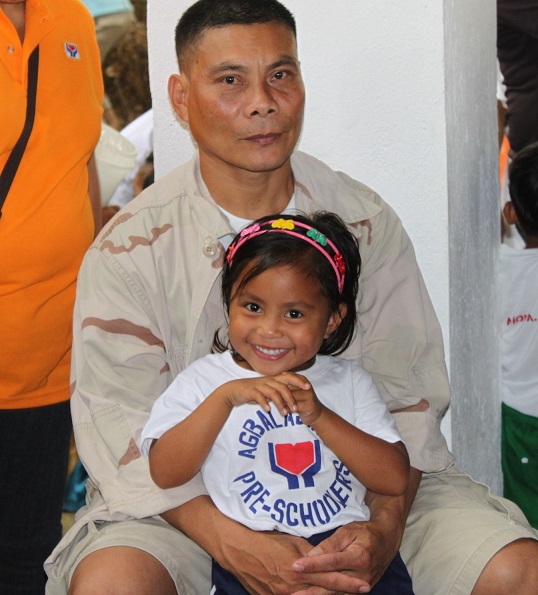DON SALVADOR BENEDICTO, Negros Occidental-A day care worker here has realized the positive results of the Supplementary Feeding program being implemented by the national government led by DSWD.
According to 39-year-old Josephine Alabate of Purok Casto, Brgy. Bagong Silang, Don Salvador, Benedicto, the program has improved the nutritional status of pre-schoolers whom she has been handling. [Five-year-old Charmel Boliboli of Agbalasan Day Care Center, also a beneficiary of Supplementary Feeding, poses for a photo with her father.]
“In 2010-2011, we have monitored 22 children as malnourished. With the Supplementary Feeding, we only have six malnourished children now,” said Alabate.

She also said that they have observed positive changes such as some children who only ate vegetable soup and rice are now eating leafy vegetables.
“We have also seen that the Supplementary Feeding program has helped ensure that children can eat nutritious food everyday. Before, some of them cannot even eat in the morning because their parents work in the field,” she said.
Likewise, five-year-old Charmel Boliboli of Agbalasan Day Care Center said that she is happy that they are benefiting from the feeding program.
“Sadya mag-eskwela. Sadya magkaon nga madamo kami (I have fun in school. I’m happy when there’s many of us eating),” Charmel said.
The supplementary feeding program is the provision of food, in addition to the regular meals, to currently enrolled day care center children. This is in the form of hot meals, as recommended by Food and Nutrition Research Institute (FNRI) , and served during break time to children in day care centers.
Who are the beneficiaries?
Beneficiaries of the program are three-year-old and four-year-old children; and those five-year-old children not catered in the Department of Education pre-school children but enrolled in day care.
This program is implemented in response to the 2006 Family Income and Expenditure Survey (FIES) conducted by the National Statistics Office which showed that 11 percent of Filipino families had income that cannot buy the food needed by family members for nutritional well-being and health.
These families can be considered as hungry and food poor. Along with Pantawid Pamilyang Pilipino Program, KALAHI-CIDSS or Kapit Bisig Laban sa Kahirapan-Comprehensive and Integrated Delivery of Social Services and Sustainable Livelihood Program, Supplementary Feeding seeks to achieve Millennium Development Goal no. 1, which is eradicating extreme poverty and hunger.
The feeding program aims to provide augmentation support through feeding program for children in day care centers. Also, it aims to improve knowledge, attitude and practices of children enrolled in day care centers, parents and caregivers through intensified nutrition and health education. In the same manner, it targets to improve and sustain the nutritional status of all target children and refer to health units medical and nutrition-related problems of children.
For the year 2012 alone, investment for Supplementary Feeding was pegged at P277 million.
Parent’s attitude
Aside from the gains directly seen among children, Alabate revealed that she has also won the cooperation of her pre-schoolers’ parents.
“Every day, six parents are assigned to do the cooking. The groups take turns in preparing the menu, which is mainly vegetables,” she said.
Pantawid Pamilya and feeding programs positive effects
Alabate also said that DSWD’s Pantawid Pamilyang Pilipino Program also plays a big factor in the development of pre-schoolers.
“I used to only have 18 to 22 pre-schoolers in my class. Now, I have more than 30. Almost all three to five year old children in our community are already in day care,” she revealed.
Alabate also said that their attendance has greatly improved and she is witness to the support of parents to their children’s education by ensuring that they have bags and school supplies.
“Before, they would send their children to school without paper and pencil. These days, parents make sure that their children have such,” Alabate said./dswd6/May R. Castillo
